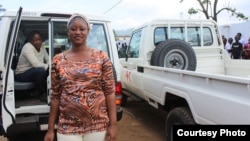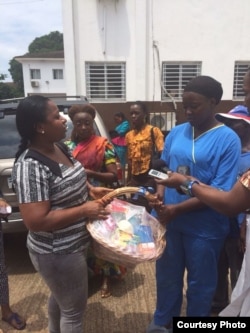The Ebola virus, indiscriminate and opportunistic, has infected more than 17,000 people in West Africa, the World Health Organization reports. But some observers fear the epidemic may be exacting an especially heavy toll on women and girls.
Its impact goes well beyond the disease itself, amplifying females’ vulnerabilities, exploiting their limits within traditional societies, and motivating responses of strength and resilience.
"Ebola is not only a public health catastrophe, it is also unleashing devastating secondary effects on economic and social development, all of which have harmful implications for women and girls," Janet Fleischman, a senior associate at the Center for Strategic and International Studies, recently wrote for the Washington think tank’s Smart Global Health blog.
From birth to death, Ebola is wreaking havoc – primarily in the three hardest-hit countries of Guinea, Liberia and Sierra Leone. Fear of infection deters women from seeking medical care during pregnancy and childbirth, likely driving up already-abysmal maternal mortality rates, health experts say [see chart below]. But the threat of contamination is greatest at death, when an Ebola patient’s viral load is highest. Cultural norms require that corpses are prepared for burial by people of the same sex – a serious problem when few women serve on official burial teams outfitted with personal protective equipment.
Between those milestones lurk a host of other risks to females.
"Reports from the region raise fears about sexual violence and exploitation of women and girls by male Ebola survivors – the virus has been found in semen for up to three months so abstinence is recommended during that period – or by men exploiting girls who are orphaned or women widowed by Ebola," Fleischman wrote.
"… In addition, property and inheritance laws may discriminate against women and girls affected by Ebola, with some reports of Ebola widows being shunned by their families and denied the ability to inherit their husband’s property."
Out of school and at risk
School closings in all three countries exacerbate low literacy rates [see chart above] and fuel other problems.
In Sierra Leone, where the Ebola caseload recently surged to more than 7,000, "we’ve heard of young ladies [falling] prey to so many different child-protection issues," said Yeniva Sisay-Sogbeh, a longtime educator now working in Freetown with the Israeli humanitarian aid group IsraAID. She helps its clients deal with trauma and loss.
Unstructured, unsupervised time heightens chances for unplanned pregnancy, Sisay-Sogbeh said, adding that she’s even "heard of young ladies in quarantine raped by a police officer meant to guard them."
And "once a girl child becomes pregnant, the possibility for that girl to go back to school is slim," added N’yella Maya Rogers, a human rights lawyer from Sierra Leone and fellow with the National Endowment for Democracy in Washington, D.C. As it is, too many in her native country "believe it’s better to send the boy to school" and have the girl stay home and do housework, she said. "… That kind of discrimination has been going on very long in a tribal society like this."
Sisay-Sogbeh also expressed concern about household incomes falling as a consequence of quarantines and other Ebola-related economic disruptions. "If money becomes a problem," she said, "you’re going to see more interest in families having [daughters] married off early."
Girls orphaned by Ebola face inequities, too.
"Most families are reluctant to take in an Ebola-affected orphan because of fear, of stigma and of poverty. But if they have room for just one, they usually will prefer the boy, as he adds status, according to the tradition," Lucy Steinitz, a protective services adviser for Catholic Relief Services, wrote in an email to VOA. "And the mother will say that a girl who is older than 5 can pose a temptation to her husband or other male relatives in the house."
Steinitz, corresponding from Freetown, cited other challenges.
"With courts not meeting, perpetrators of sexual violence seem to act with impunity," she wrote.
Also, provisions to quarantined homes usually don't include sanitary supplies for menstruating women, "a huge oversight," Steinitz wrote.
Adjusting burial teams
Perhaps the most widespread immediate risk involves Ebola contagion through traditional burial practices. Anthony Banbury, who heads the United Nations Mission for Ebola Emergency Response, told the Associated Press it appears that women are washing female victims’ corpses before calling authorities to collect them.
In Sierra Leone, the 1,583 fatalities recorded as of November 30 were almost equally divided between males (51 percent) and females (49 percent), a spokeswoman for the World Health Organization’s Sierra Leone office reported, citing figures from the national health ministry.
But women’s representation on burial teams is not. The Sierra Leone Red Cross Society, one of several entities authorized to provide safe burials, has 50 teams nationwide – and 20 women among them, spokesman Edward Aloushious Renner said. But, he added, "more women seem to be coming forward."
Fatmata Sowa, one of four women volunteering in the country’s Western Area district, joined the effort "to help break the transmission of Ebola through dead bodies," she said in a short profile posted on the national society’s Facebook page.
When the Ebola victim is female, "I will be the first to enter the room ... to ensure that she is covered in a dignified position before my male colleagues would be allowed to enter," said Sowa, described in another Red Cross article as a 28-year-old mother of two.
She then will wash and dress the body, preparing it for burial.
More data sought
Fleischman, a specialist on women’s global health issues and related U.S. policy, recommends collecting and publicly sharing sex-disaggregated data about Ebola infections and deaths.
"We’ve learned in past crises that you can’t wait … to start looking at whether there is a disproportionate impact on girls and women," Fleischman, who has studied HIV/AIDS and other public health threats, told VOA. "You have to start looking at that as you’re developing policies and programs."
She said existing U.S.-supported international programs – including some on curbing gender-based violence or planning families – could serve as models for applying the gender lens.
Fleischman also urged investigating reported abuses against women and girls as part of the Ebola response.
Empowering women
She and others called for more authority and respect for women, involving them in everything from the immediate Ebola response to rebuilding communities.
That’s easier said than done. Though Liberia has a woman president, Ellen Sirleaf Johnson, in neighboring Sierra Leone, "certain sections of our country do not allow women to be leaders," said Doris Lenga-Caulker Gbabiyor.
Caulker is paramount chief, or administrator, of Kagboro chiefdom, about 100 kilometers or 62 miles southeast of Freetown. She said she was pleased to learn women had been added to burial teams, because "women should be represented." Her chiefdom has held down the number of Ebola infections to 10, she said, adding, "We’ve put responsible people around."
Sisay-Sogbeh isn’t waiting for a call to action; she's issuing it. In August, she started Power Women 232, a network of Sierra Leone women professionals that takes its name from the country’s telephone exchange code.
"Community service is part of the mandate," she said of the Freetown-based organization.
This fall, its members organized food drives, delivering at least 450 baskets to health care workers in Ebola isolation units, to patients and survivors and to orphans.
Early in the new year, Sisay-Sogbeh said the network would look at other ways to help. "The welfare of women and children is our business. It is our concern," she said. "We want to look into advocacy for building empowerment."
Rogers, the human rights attorney, called for more efforts to involve women in Ebola education: "When women are sensitized, when they are fully aware, they are the ones who will be able to fully pass [the information] on to other family members."
And when decisions are made and policies set, "women should be involved from the community level" on up, Rogers said. "If they are leaving women behind, it will be hard to end Ebola."













